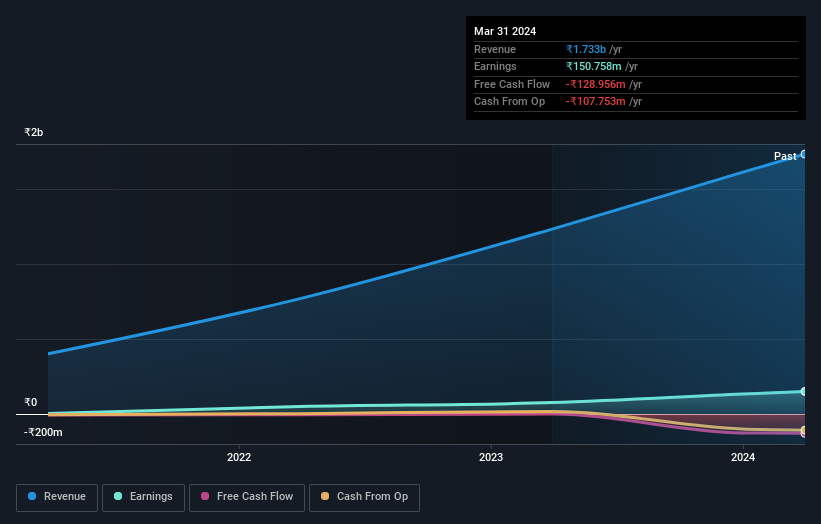Stock Analysis
- India
- /
- Healthcare Services
- /
- NSEI:DENTALKART
The recent 11% gain must have brightened CEO Vikas Agarwal's week, Vasa Denticity Limited's (NSE:DENTALKART) most bullish insider

Key Insights
- Vasa Denticity's significant insider ownership suggests inherent interests in company's expansion
- The top 2 shareholders own 66% of the company
- Ownership research, combined with past performance data can help provide a good understanding of opportunities in a stock
A look at the shareholders of Vasa Denticity Limited (NSE:DENTALKART) can tell us which group is most powerful. And the group that holds the biggest piece of the pie are individual insiders with 74% ownership. In other words, the group stands to gain the most (or lose the most) from their investment into the company.
As a result, insiders scored the highest last week as the company hit ₹9.0b market cap following a 11% gain in the stock.
Let's delve deeper into each type of owner of Vasa Denticity, beginning with the chart below.
See our latest analysis for Vasa Denticity

What Does The Lack Of Institutional Ownership Tell Us About Vasa Denticity?
We don't tend to see institutional investors holding stock of companies that are very risky, thinly traded, or very small. Though we do sometimes see large companies without institutions on the register, it's not particularly common.
There are many reasons why a company might not have any institutions on the share registry. It may be hard for institutions to buy large amounts of shares, if liquidity (the amount of shares traded each day) is low. If the company has not needed to raise capital, institutions might lack the opportunity to build a position. It is also possible that fund managers don't own the stock because they aren't convinced it will perform well. Institutional investors may not find the historic growth of the business impressive, or there might be other factors at play. You can see the past revenue performance of Vasa Denticity, for yourself, below.

Vasa Denticity is not owned by hedge funds. With a 40% stake, CEO Vikas Agarwal is the largest shareholder. For context, the second largest shareholder holds about 26% of the shares outstanding, followed by an ownership of 2.1% by the third-largest shareholder. Interestingly, the second-largest shareholder, Sandeep Aggarwal is also Chief Financial Officer, again, pointing towards strong insider ownership amongst the company's top shareholders.
To make our study more interesting, we found that the top 2 shareholders have a majority ownership in the company, meaning that they are powerful enough to influence the decisions of the company.
While it makes sense to study institutional ownership data for a company, it also makes sense to study analyst sentiments to know which way the wind is blowing. As far as we can tell there isn't analyst coverage of the company, so it is probably flying under the radar.
Insider Ownership Of Vasa Denticity
The definition of an insider can differ slightly between different countries, but members of the board of directors always count. The company management answer to the board and the latter should represent the interests of shareholders. Notably, sometimes top-level managers are on the board themselves.
I generally consider insider ownership to be a good thing. However, on some occasions it makes it more difficult for other shareholders to hold the board accountable for decisions.
Our information suggests that insiders own more than half of Vasa Denticity Limited. This gives them effective control of the company. That means they own ₹6.6b worth of shares in the ₹9.0b company. That's quite meaningful. Most would argue this is a positive, showing strong alignment with shareholders. You can click here to see if those insiders have been buying or selling.
General Public Ownership
The general public-- including retail investors -- own 26% stake in the company, and hence can't easily be ignored. This size of ownership, while considerable, may not be enough to change company policy if the decision is not in sync with other large shareholders.
Next Steps:
It's always worth thinking about the different groups who own shares in a company. But to understand Vasa Denticity better, we need to consider many other factors. For instance, we've identified 2 warning signs for Vasa Denticity (1 can't be ignored) that you should be aware of.
If you would prefer check out another company -- one with potentially superior financials -- then do not miss this free list of interesting companies, backed by strong financial data.
NB: Figures in this article are calculated using data from the last twelve months, which refer to the 12-month period ending on the last date of the month the financial statement is dated. This may not be consistent with full year annual report figures.
Valuation is complex, but we're helping make it simple.
Find out whether Vasa Denticity is potentially over or undervalued by checking out our comprehensive analysis, which includes fair value estimates, risks and warnings, dividends, insider transactions and financial health.
View the Free AnalysisHave feedback on this article? Concerned about the content? Get in touch with us directly. Alternatively, email editorial-team (at) simplywallst.com.
This article by Simply Wall St is general in nature. We provide commentary based on historical data and analyst forecasts only using an unbiased methodology and our articles are not intended to be financial advice. It does not constitute a recommendation to buy or sell any stock, and does not take account of your objectives, or your financial situation. We aim to bring you long-term focused analysis driven by fundamental data. Note that our analysis may not factor in the latest price-sensitive company announcements or qualitative material. Simply Wall St has no position in any stocks mentioned.
About NSEI:DENTALKART
Solid track record with adequate balance sheet.

